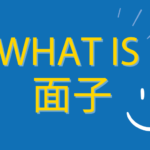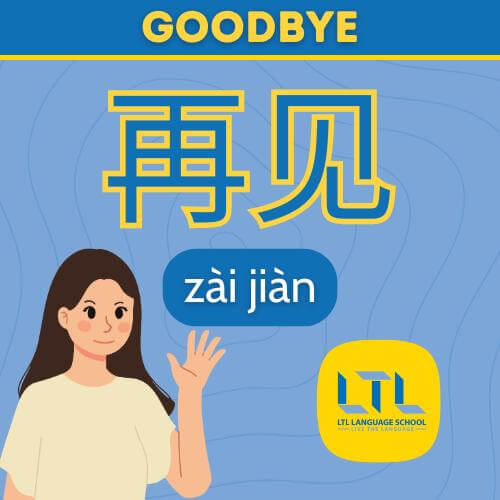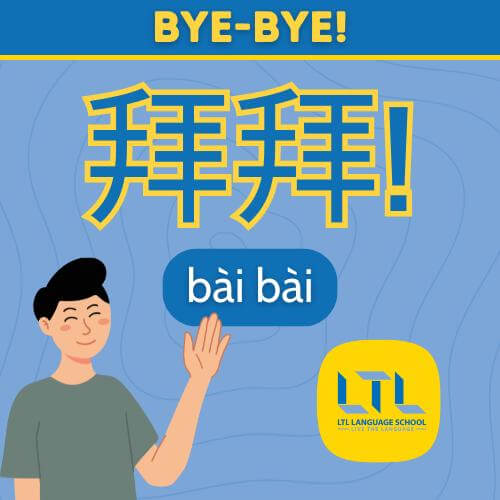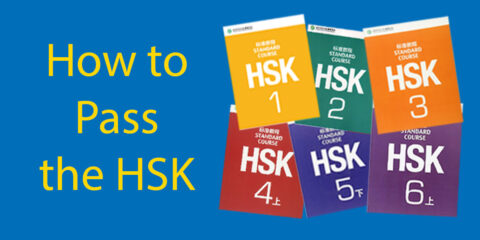Learn How to Say Goodbye in Chinese like a Native Speaker

See ya later, alligator.
In a while, crocodile!
Ok, so there might not be an exact translation for THAT in Mandarin, but there are a lot of useful phrases that you can learn for bidding someone farewell.
In today’s post, we’re going to walk you through 17 ways to say goodbye in Chinese, including casual and more formal ways.
Afterwards, we’ll teach you a couple of Chengyu for those who want to sound extra ✨fancy✨
BONUS: we’ve even thrown in a bit of goodbye etiquette, so you’ll never have to experience another social faux pas again!
Goodbye in Chinese || Essential Phrases
Goodbye in Chinese || Time + 见
Goodbye in Chinese || Useful Chengyu
Goodbye in Chinese || Goodbye Etiquette
Goodbye in Chinese || FAQs
Goodbye in Chinese || Essential Phrases
As with any language, there’s more than one way to say goodbye in Mandarin Chinese.
👉 Remember, Chinese is a tonal language and this is super important for pronouncing words correctly. If you’re unsure about how to read and say them, check out our Guide to Chinese Tones.
Depending on the formality of the situation, the length of time you’ll be apart or even just your mood, you may choose one form over another.
So it definitely helps to have a few variations up your sleeve!
#1 再见 zàijiàn
The first way of saying goodbye in Chinese that most students learn is 再见 zàijiàn
There’s a reason students all start off with this phrase. It’s a very common, standard way of saying goodbye to someone.
You can use this in almost every situation and in any level of formality.
再见 literally translates to see you again:
再 (zài):again
见 (jiàn):meet
#2 拜拜 bài bài
This one should be pretty easy to remember, as it sounds exactly like, “bye bye!”
This phrase is a loanword that has been adapted from English and is increasingly common amongst people of all ages – these days you might hear it more often that 再见!
We’d recommend using it in friendly, relaxed or informal situations.
The character 拜 originally meant to pay a visit or to worship – but in the context of wishing someone farewell, there’s no relation to the original meaning!
Another variation you might encounter is 拜了 bài le, whose usage is the same.
#3 我先走了 wǒ xiān zǒule
This is a great one to learn for when leaving the office!
Literally, 我先走了 translates into ‘I go first’.
However, its meaning is closer to ‘I’ve got to go’ or ‘I’ve gotta run’. It can be used if you need to leave before someone else and can be combined with 拜拜 bài bài.
BONUS | Find out how to say Goodbye in Japanese!
#4 我不得不说再见了 wǒ bùdé bù shuō zàijiànle
Yes, we agree – this one is a bit of a mouthful!
Let’s break it down:
我不得不 wǒ bùdé bù:I have to
说再见了 shuō zàijiànle:say goodbye
This is a great phrase for expressing that you don’t want to go, but you simply have to.
Maybe save it for when you want to show off though – this one isn’t commonly used in daily life!

What is 面子 | A Guide to “Face” and Why it’s So Important in China
What is Mianzi 面子 and why is it so important? Today we take a look at an important part of Chinese culture – face.
#5 我要说再见了! 因为我还有事 wǒ yào shuō zàijiànle! Yīnwèi wǒ hái yǒushì
Another mouthful – but this sounds more natural than the last one!
This means “I have to say goodbye because I have things to do” and is a great way to exit a conversation without looking rude.
”有事” yǒushì means you have something to deal with.
Alternatively, you can add a more specific reason after “因为” yīnwèi, which means ‘because’ – but 有事 will usually suffice!
You can use this in most situations, including with friends or at the workplace.
#6 周末愉快 zhōumò yúkuài

If Friday is here, 5 o’clock is on the horizon and you want to wish your colleagues or classmates a happy weekend, this is the phrase for you!
This means ‘have a great weekend’.
Literally, it translates into:
周末 weekend
愉快 happy
Another, more casual, variant you might hear is 周末快乐 zhōumò kuàilè! This also literally means ‘weekend happy’ and is used to wish someone a great weekend.
#7 晚安 wǎn’ān
Just like 周末愉快 (zhōumò yúkuài), this one is time-specific.
晚安 means goodnight, so you can use this one when you’re heading home later in the evening.
It’s also a nice way to end a text discussion if you need to catch some Z’s!

How To Use A Mobile Phone in Chinese📱Your Pocket Guide
How can I use my mobile phone in Chinese? This is a full-proof, winning technique for helping improve your Chinese. Take it from someone who made the leap.
#8 挂了啊 guà le a
Just like how Chinese people have a specific word to answer the phone (喂? Wèi?), there’s also a specific word for hanging up the phone.
To let someone know you’re about to hang up the phone, you can say 挂了啊.
Equally, if you hear this phrase, don’t be surprised when the phone call suddenly ends!
#9 有空再聊 yǒu kòng zài liáo
This phrase means ‘Let’s talk when you’re free‘.

Sometimes you’ll catch people at an inconvenient time and might have to agree to rendezvous at a later time when they’re more free to talk.
In that instance, using this sentence is a quick and polite way to convey that intention.
有空 (yǒu kòng) means ‘to have free time’
再聊 (zài liáo) means to ‘speak later’
Have you heard any other variants of goodbye in Chinese? Let us know in the comments section!
Goodbye in Chinese || Time + 见
Sometimes, when you’re saying goodbye, you want to show it isn’t goodbye forever.
You might even want to express a particular time that you will see that person again.
👉 In Chinese, this can be expressed with ‘Time + 见’. Remember, 见 (jiàn) means ‘to meet’.
Let’s take a look at some examples…
#10 明天见 míngtiān jiàn
明天 míngtiān means tomorrow, so altogether this phrase means see you tomorrow!
This is a great phrase for colleagues, classmates and teachers who you see regularly.
BONUS: Learn how to say today and yesterday in Chinese!
#11 下周见 xià zhōu jiàn
This phrase means ‘See you next week!’
Let’s break it down word by word:
下 (xià): next
周 (zhōu): week
见 (jiàn): meet
#12 一会儿见 yīhuǐ’er jiàn
This is a useful phrase if you’re going to see someone soon, even as soon as the same day.
一会儿 (yīhuǐ’er) means ‘a moment’ or ‘a little while’.
So altogether, this means ‘See you in a moment!’ or ‘See you soon!’
#13 下次见 xià cì jiàn
⚠️ Useful phrase alert! ⚠️
下次见 (xià cì jiàn) means ‘see you next time’. This is a great phrase for someone you meet up with regularly (e.g. a tutor, language exchange partner or personal trainer).
It indicates that you plan to see them again without having to specify a particular time.
You can customize this phrase to fit the situation. Simply add a time or day before ‘见’ and you’ll have a more specific way of saying goodbye to anyone!
Goodbye in Chinese || Useful Chengyu
First things first, if you don’t know what we mean by a Chengyu, make sure to check out our Guide to Chinese Chengyu here.
For slightly more advanced learners, you’ll already know that 成语 (chéngyǔ) are four character phrases that carry a metaphorical meaning.
You can find a Chengyu for almost any situation – and saying goodbye is no exception!
#14 一路平安 yīlù píng’ān

This is a great Chengyu to use when someone is saying goodbye to go on a journey or trip somewhere.
It means ‘have a safe trip’.
一路 (yīlù) means throughout the journey and 平安 (píng’ān) means safe and sound.
Think of this phrase as the Chinese bon voyage!
Alternatively, you could say…
#15 一路顺风 yīlù shùnfēng
This Chengyu can also be used to wish someone a safe and pleasant journey.
顺风 (shùnfēng) actually means ‘favourable winds’ but is used to mean successful or smooth.
#16 生离死别 shēng lí sǐ bié
Note: this is not for everyday use!
This Chengyu means to part ways and never reunite – in other words, goodbye forever.
Literally, it means ‘separated in life and death’ – yikes 😶🌫️
Maybe best not said as you leave the office!
#17 劳燕分飞 láo yàn fēn fēi
Last but not least, let’s end on one more depressing Chengyu!
劳燕分飞 (láo yàn fēn fēi) means ‘two birds flying in different directions’ and is used to describe the breakup of a couple.
Hopefully not a form of goodbye you’ll be using anytime soon!

Chinese Proverbs: 9 of the Best Chinese Sayings // PLUS Bonus Quiz
While there are many sayings in English, Chinese proverbs are comparatively used much more frequently in everyday speech. These are called chéngyǔ 成语.
Goodbye in Chinese || Goodbye Etiquette
Depending on where you’re from, you might be used to saying goodbye in a multitude of ways.
That could be a hug, a handshake or a kiss (or several!)
However, in China, when saying goodbye to friends, classmates or coworkers, definitely avoid going for a kiss on the cheek!
This isn’t common at all in China and may even be seen as inappropriate. We’d also recommend avoiding hugging someone unless you’re very close.
👉 For most situations, simply saying 拜拜 (bàibài) and waving your hand is perfectly acceptable.
In a business setting, it’s also totally fine to go in for a handshake when saying hello or goodbye.
Have you experienced any social faux pas in China? Have your say in the comments section!
Goodbye in Chinese || FAQs
How do you say goodbye in Chinese?
In Mandarin Chinese, the most standard way of saying goodbye is 再见 zàijiàn.
How do you say bye-bye in Chinese?
In Mandarin Chinese, bye-bye is 拜拜 (bàibài), a loanword from English.
Are there any Chengyu I can use for saying goodbye in Chinese?
If someone is going on a trip and you’d like to wish them a smooth and pleasant journey, you can say 一路平安 (yīlù píng’ān).
Do people kiss on the cheek in China?
Generally, no. When saying hello or goodbye to someone in China, you can simply say the words and add a wave if you’d like to. In business situations, you can also go for a handshake.
How can I practice speaking Chinese?
You can practice speaking with native speakers at any time on our online Flexi Classes platform.
Want more from LTL?
If you wish to hear more from LTL Mandarin School why not join our mailing list? We give plenty of handy information on learning Chinese, useful apps to learn the language and everything going on at our LTL schools!
Sign up below and become part of our ever-growing community!
BONUS || Want to study Chinese with us in Chengdu? Why not check out our group courses or individual Chinese classes.

 Hi, my name is Sabatino. I am from Italy and I am a Student Advisor at LTL. Fancy coming to study with us in China?
Hi, my name is Sabatino. I am from Italy and I am a Student Advisor at LTL. Fancy coming to study with us in China? Hi, my name is Mojca. I am from Slovenia in Europe and I work as a student advisor at our Chengdu school.
Hi, my name is Mojca. I am from Slovenia in Europe and I work as a student advisor at our Chengdu school.








